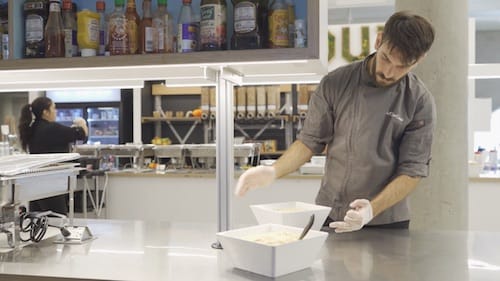Catering to Customer Success: ZeroCater’s Secret Recipe to a Customer-First Organization



We sat down with Joanel Bernardo, director of customer success at ZeroCater, to discuss the secret to building their culture of customer success. Learn how this culture has helped set their company up for high growth.
Is your small business striving to be customer-first? We sat down with Joanel Bernardo, director of customer success at ZeroCater, to discuss the secret to building their culture of customer success. Learn how this culture has helped set their company up for high growth.
1. You’ve spent many years in customer success. What have you learned about building customer-first organizations?
Customer success is always changing and evolving, though what lives at its core is the need to humanize your business. People love working with people, and their experiences are what drives them to purchase from and continue supporting the companies they love.
When you start creating a customer-first organization, make sure you have a very clear goal and marching order for that group. Customer success can mean so many things to different people, so be very clear what customer success is, and is not, for your company. Doing this will allow your leader, or yourself, to ensure that every action taken aligns with your team’s goals.
Customer success teams are an integral part of protecting your company’s revenue; it’s important to remember the value they bring to your overall revenue. Understanding your company’s cost to acquire a customer (CAC) is a good metric to compare to how much it costs to retain your customers. Did you know that it’s five times more expensive to gain a customer than it is to keep them? Think about long it takes for you to recoup that acquisition cost. That is why a customer success organization is so important — they can help ensure that year two and beyond stay part of your revenue stream.
2. One of ZeroCater’s core values is “Be Customer-Obsessed.” How does your team stay true to this every day? How has technology helped your team practice this value?
Everything we do should be done with our customers in mind. In customer success, we are the voice of the customer internally, which means we advocate for our customer’s needs cross-functionally and also build processes to ensure they are successful with their food programs.
Technology is the root of our business — we are all living on Salesforce to record and extract data. Our sales team keeps a record of our potential customers, as well as crucial details around current customers’ goals for their food program. My team is using that information to have intelligent conversations with our customers and inform them of how our product is helping them achieve their goals. In summary, if you need to know anything about an account, you need to put it in Salesforce.
I always say, “If it’s not in Salesforce, it didn’t happen.” It’s so important to put all the details in your customer relationship management (CRM) system. Any great customer success manager (CSM) is not only taking notes about their customer’s needs but is documenting useful information to know about their customers at the human level, too. It’s so important to make personal connections that go beyond the business.
3. ZeroCater has been rapidly growing. How do you motivate your team to always put the customer first as the team scales or encounters change?
One thing that we do really well at ZeroCater is work cross-functionally between teams. If there is something that we need to change from a process perspective, we take the time to think about how it impacts our customer’s experience. Ultimately, if you hear feedback from one customer, there are an additional three out there who have similar experiences but haven’t voiced them yet. I’d say that keeping the team motivated falls on the shoulders of their leader; the team needs to feel heard and also needs to believe that leadership will help find a way to solve the issue. It also really helps when the CSM brings suggestions to the table too!
4. What traits or qualities do you look for in hiring and building out a customer success team? What’s the most important success factor for an individual in a customer support role?
When I was in sales, I loved knowing that whatever I was selling was really solving a problem for my customer. I realized what I actually loved were the relationships I built with my customers, so when the opportunity came for me to make the switch, I dove for it. That’s a long-winded way of saying: anyone with a sales background could be great at this role. If you are a creative problem solver, who is focused on outcomes, you can be a CSM. Make sure the person is passionate about customers and understands that customer success goes beyond plain old customer service. It’s not about making customers happy; it’s about achieving goals — together
To become a successful CSM, you also have to understand that the role isn’t only about retaining your customers — it’s also about growing them. Being able to build value is essential, and being comfortable asking a customer for more of their business is a critical component of a CSM’s success.
Lastly, I’d say a good trait to have in a CSM is someone who is genuine and unafraid of approaching hard topics. I often tell my CSMs you have to be comfortable with being uncomfortable. Being a great CSM doesn’t mean that you say ‘yes’ all the time; it means that you find the best possible solution. Sometimes that means saying ‘no’ or resetting an expectation.
5. How do you determine what success looks like for you and your team at ZeroCater?
Our teams are focused on maintaining the book of business and building relationships with our customers. Our goal is to understand our customers so well that we know what they need before they reach out to us. We also know our Ecosystem of Culinary Partners so well that we can identify who would be a great fit for our customers’ meals or events.
I also attribute success to metrics — this is why it’s so important to have a platform that tracks activities and works like your system of record. Focus on key performance indicators (KPIs) that will drive the results you need the team to achieve — calls, emails, meetings set, quarterly business reviews (QBRs) delivered, issue management, cases, and so on. For us, anytime you do something related to your account — it needs to be documented. This helps us identify customer health and ensure smooth transitions between CSMs.
Lastly, I personally think that work should be fun. Even when things are stressful, there’s a lesson to be learned and a skill that can be developed.
6. If you had one piece of advice for small businesses on creating a culture of customer success, what would it be?
Take the time to listen to your customers and leave your emotions at the door. That may sound harsh, but if you want a customer to really tell you what is (and isn’t) working for them, you have to be willing to listen to them and take action. It’s often hard to separate yourself from your product or business — successful leaders have mastered this skill and understand how important creating boundaries between the two is to their success. Establish a customer advisory board or a handful of customers that you meet with once a quarter to understand what else they’re looking for from you as their partner. Remember when I said for every one person that complains there are three who secretly frustrated? These conversations will help you avoid bigger retention problems in the future.
Learn more about ZeroCater’s culture of customer success at the Small Business Keynote and hear from their CEO, Ali Sabeti. Can’t make it to San Francisco? Tune in to the keynote and all the action of Dreamforce on Salesforce Live.
Salesforce Essentials helps you find more customers, win their business, and keep them happy so you can grow faster than ever. Learn more about our small business CRM solutions by following us on Twitter, LinkedIn, and Instagram.

























